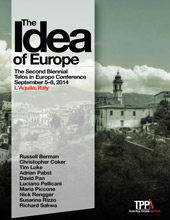By Adrian Pabst · Thursday, September 11, 2014 The following paper was presented at the recent Telos in Europe conference on “The Idea of Europe,” held in L’Aquila, Italy, on September 5–8, 2014.
 The continual crisis in Ukraine is perpetuating an East-West schism that was never overcome after the end of the Cold War. Even if there is no all-out war between the major powers involved in the Ukrainian conflict, Europe faces the distinct prospect of a permanent divide at its very heart. The EU increasingly looks like an annex to the United States, which oscillates between isolationism and interventionism. Meanwhile Russia is fast becoming a vassal state that supplies cheap resources to China. After more than 500 years at the center of international affairs, the whole of Europe is bereft of ideas and incapable of acting as a force for good. The continual crisis in Ukraine is perpetuating an East-West schism that was never overcome after the end of the Cold War. Even if there is no all-out war between the major powers involved in the Ukrainian conflict, Europe faces the distinct prospect of a permanent divide at its very heart. The EU increasingly looks like an annex to the United States, which oscillates between isolationism and interventionism. Meanwhile Russia is fast becoming a vassal state that supplies cheap resources to China. After more than 500 years at the center of international affairs, the whole of Europe is bereft of ideas and incapable of acting as a force for good.
Continue reading →
By Telos Press · Tuesday, September 9, 2014 Writing in today’s USA Today, Glenn Harlan Reynolds (aka Instapundit) reviews Joel Kotkin’s The New Class Conflict, just published by Telos Press. Order your copy in our online store.
 We’ve heard a lot of election-year class warfare talk, from makers vs. takers to the 1% vs. the 99%. But Joel Kotkin’s important new book, The New Class Conflict, suggests that America’s real class problems are deeper, and more damaging, than election rhetoric. We’ve heard a lot of election-year class warfare talk, from makers vs. takers to the 1% vs. the 99%. But Joel Kotkin’s important new book, The New Class Conflict, suggests that America’s real class problems are deeper, and more damaging, than election rhetoric.
Traditionally, America has been thought of as a place of great mobility—one where anyone can conceivably grow up to be president, regardless of background. This has never been entirely true, of course. Most of our presidents have come from reasonably well-off backgrounds, and even Barack Obama, a barrier-breaker in some ways, came from an affluent background and enjoyed an expensive private-school upbringing. But the problem Kotkin describes goes beyond shots at the White House. . . .
Continue reading →
By Telos Press · Tuesday, September 2, 2014  On the Liberty Law Talk podcast today, Joel Kotkin talks with host Richard Reinsch about The New Class Conflict, now available from Telos Press. It’s a smart, wide-ranging interview that covers many of the central issues Kotkin raises in his new book: the way that today’s high-tech oligarchy, unlike the early twenty-century industrial magnates, have amassed both financial and cultural power; the exacerbation of wealth inequality in places like California as a result of government bureaucratization; the consolidation of the media by coastal urban elites and the consequent effect on cultural perceptions; the control over both U.S. political parties by the wealthy and the resulting distortion of the democratic process; and a whole lot more. On the Liberty Law Talk podcast today, Joel Kotkin talks with host Richard Reinsch about The New Class Conflict, now available from Telos Press. It’s a smart, wide-ranging interview that covers many of the central issues Kotkin raises in his new book: the way that today’s high-tech oligarchy, unlike the early twenty-century industrial magnates, have amassed both financial and cultural power; the exacerbation of wealth inequality in places like California as a result of government bureaucratization; the consolidation of the media by coastal urban elites and the consequent effect on cultural perceptions; the control over both U.S. political parties by the wealthy and the resulting distortion of the democratic process; and a whole lot more.
Continue reading →
By Telos Press · Monday, September 1, 2014 Telos Press Publishing is delighted to announce that Joel Kotkin’s The New Class Conflict is now available. Purchase your copy today in our online store.
 In ways not seen since the Gilded Age of the late nineteenth century, America is becoming a nation of increasingly sharply divided classes. Joel Kotkin’s The New Class Conflict breaks down these new divisions for the first time, focusing on the ascendency of two classes: the tech Oligarchy, based in Silicon Valley; and the Clerisy, which includes much of the nation’s policy, media, and academic elites. In ways not seen since the Gilded Age of the late nineteenth century, America is becoming a nation of increasingly sharply divided classes. Joel Kotkin’s The New Class Conflict breaks down these new divisions for the first time, focusing on the ascendency of two classes: the tech Oligarchy, based in Silicon Valley; and the Clerisy, which includes much of the nation’s policy, media, and academic elites.
The New Class Conflict is written largely from the point of view of those who are, to date, the losers in this class conflict: the middle class. This group, which Kotkin calls the Yeomanry, has been the traditional bulwark of American society, politics, and economy. Yet under pressure from the ascendant Oligarchs and ever more powerful Clerisy, their prospects have diminished the American dream of class mobility that has animated its history and sustained its global appeal.
This book is both a call to arms and a unique piece of analysis about the possible evolution of our society into an increasingly quasi-feudal order. Looking beyond the conventional views of both left and right, conservative and liberal, Kotkin provides a tough but evenhanded analysis of our evolving class system, and suggests some approaches that might restore the middle class to its proper role as the dominant group in the American future.
Continue reading →
By Dirk Braunstein · Wednesday, August 27, 2014 An article by Hamid Dabashi recently appeared in the online version of the English-language edition of Al Jazeera. Dabashi teaches Iranian Studies and Comparative Literature at Columbia University, where the exiled Frankfurt School thinkers Max Horkheimer and Theodor Adorno found refuge during the period of National Socialism. Dabashi quotes Adorno’s 1949 thesis that it is barbaric to write poetry after Auschwitz and asks what it really means: “How could writing poetry after a calamity such as Auschwitz, and by extension a horror like the Holocaust, be something barbaric? Doesn’t poetry console in moments of mourning and despair?”
Continue reading →
By Telos Press · Monday, August 25, 2014 Telos Press author Matthias Küntzel was recently interviewed by the Times of Israel regarding a planned trade mission by the German Near and Middle East Association, or NUMOV, to Iran in December. Küntzel’s forthcoming book, Germany and Iran: From the Aryan Axis to the Nuclear Threshold, will be published by Telos Press in November.
Continue reading →
|
|
 The continual crisis in Ukraine is perpetuating an East-West schism that was never overcome after the end of the Cold War. Even if there is no all-out war between the major powers involved in the Ukrainian conflict, Europe faces the distinct prospect of a permanent divide at its very heart. The EU increasingly looks like an annex to the United States, which oscillates between isolationism and interventionism. Meanwhile Russia is fast becoming a vassal state that supplies cheap resources to China. After more than 500 years at the center of international affairs, the whole of Europe is bereft of ideas and incapable of acting as a force for good.
The continual crisis in Ukraine is perpetuating an East-West schism that was never overcome after the end of the Cold War. Even if there is no all-out war between the major powers involved in the Ukrainian conflict, Europe faces the distinct prospect of a permanent divide at its very heart. The EU increasingly looks like an annex to the United States, which oscillates between isolationism and interventionism. Meanwhile Russia is fast becoming a vassal state that supplies cheap resources to China. After more than 500 years at the center of international affairs, the whole of Europe is bereft of ideas and incapable of acting as a force for good. 


